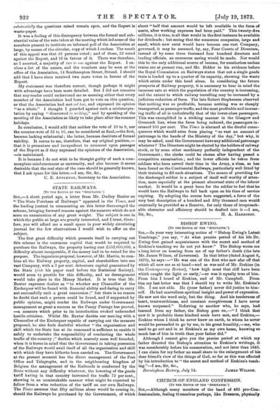STATE RAILWAYS.
[TO THE EDITOR OF THE"SPECTATOR."]
Sis,—A short period ago, a letter from Mr. Dudley Baxter on "The State Purchase of Railways" appeared in the Times, and the leading journal in commenting on this letter discouraged the scheme, bringing forward reasons against the measure which do not seem on examination of any great weight. The subject is one in which the public at large are greatly interested, and I trust, there- fore, you will afford me a small space in your widely circulating journal for the few observations I would wish to offer on the subject.
The first great difficulty which presents itself in carrying out this scheme is the enormous capital that would be required to purchase the Railways, the property having cost 1,552,000,000, a difficulty almost insuperable, if the money had to be raised for the purpose. The ingenious proposal, however, of Mr. Martin, to com- bine all the Railway property, capital, and shareholders into one vast Company, with a 3 per cent, debenture capital guaranteed by the State (vide his paper read before the Statistical Society), would seem to provide for this difficulty, and no derangement would take place in the Money Market. It is true that Mr. Baxter expresses doubts as "to whether any Chancellor of the Exchequer will be found with financial ability and daring to carry out successfully such a great conversion ;" but there is no reason to doubt that such a person could be found, and if supported by public opinion, might render the Railways under Government management as great a success as the Penny Postage has proved, —a measure which prior to its introduction evoked unbounded hostile criticism. Whilst Mr. Baxter doubts our mee'.,ing with a Chancellor of the Exchequer capable of carrying out the measure proposed, he also feels doubtful whether "the organisation and skill which the State has at its command is sufficient to enable it safely to undertake the responsibility of conducting the whole traffic of the country ;" doubts which scarcely seem well founded, when it is borne in mind that the Government in taking possession of the Railways would avail itself of all the organisation and skill with which they have hitherto been carried on. The Government at the present moment has the direct management of the Post Office and Telegraphs, and in the neighbouring kingdom of Belgium the management of the Railroads is conducted by the State without any difficulty whatever, the lowering of the goods tariff having in that country increased the traffic 72 per cent., showing in an unmistakable manner what might be expected to follow from a wise reduction of the tariff on our own Railways. The Times assumes that fifty millions alone would be coming in, should the Railways be purchased by the Government, of which about "half that amount would be left available in the form of assets, after working expenses had been paid." This twenty-five millions, it is true, is all that would in the first instance be available for dividends ; but seeing that the numerous companies, large and small, which now exist would have become one vast Company, governed, it may be assumed, by, say, Four Courts of Directors, instead of by some three thousand four hundred directors and leading officials, an enormous saving would be made. Nor would this be the only additional source of income, for numberless useless. trains are at present run, and Mr. Bidder in his evidence before the Royal Commission on Railways states that not a single goods train is loaded up to a quarter of its capacity, showing the waste- which exists under this head alone. In considering the future prospects of Railway property, it is necessary to bear in mind the immense rate at which the population of the country is increasing, and the extent to which railway travelling may be increased by a judicious reduction of fares. The late Robert Stephenson observed- that nothing was so profitable, because nothing was so cheaply transported, as passenger traffic, and the most profitable and increas- ing traffic of all is undoubtedly that of the lower-class passengers. This was exemplified in a striking manner in the Glasgow and Greenock line, when the fares being reduced, the passengers in- creased 100 per cent. The Times is alarmed at the direful conse- quences which would arise from placing "so vast an amount of patronage in the hands of the Ministry of the day," but why, it may be asked, need the Government have any additional patronage- whatever? The Directors might be elected by the holders of railway stock, or by some other machinery perfectly independent of the ; the clerks could be chosen after having passed a competitive examination ; and the lower officials be taken from soldiers who have served their time in the Army, a class, as has- been found on the Continental Railways, particularly well fitted by their training to fill such situations. The means of providing for the discharged soldier is a subject of itself well worthy of atten- tion, more especially at the present abnormal state of the labour market. It would be a great boon for the soldier to feel that ho- would have the Railways to fall back upon on his time of service expiring. By adopting the course here suggested, a force of the very best description of a hundred and fifty thousand men would eventually be provided as a Reserve, for only those of irreproach- able character and efficiency should be drafted into it —I am,.


































 Previous page
Previous page